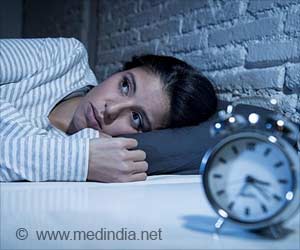A new study led by investigators at Brigham and Women’s Hospital highlights the important interconnection between sleep patterns and mental and behavioral outcomes, such as anxiety and depression symptoms, and substance use.
The study, which leverages data collected both from wearable devices before the pandemic and in June 2020, found that short sleep duration and inconsistent sleep timing were associated with adverse mental health symptoms. Results are published in Sleep Health.
“Our study speaks to the importance of sleep for mental health, especially in the context of stressful episodes,” said corresponding author Mark Czeisler, AB, of the Department of Psychiatry at the Brigham. “Making an effort to prioritize sleep and develop a regular sleep schedule can offer protection during these times.”
Czeisler and colleagues developed The COVID-19 Outbreak Public Evaluation (COPE) Initiative (www.thecopeinitiative.org) to survey adults about attitudes, behaviors, and beliefs about COVID-19 mitigation efforts and to assess mental and behavioral health during the pandemic.
The team also leveraged data from almost 5,000 active users of WHOOP, a commercial, digital sleep wearable company based out of Boston. The researchers compared sleep data from before and during the pandemic.
About 15 percent of the 5,000 users responded to the researchers’ survey. Compared to pre-pandemic, in June 2020 participants experienced:
- Longer sleep duration, and more consistent sleep timing during the pandemic: On average, participants got 15 more minutes of sleep each night. Sleep timing was more consistent for participants during the pandemic. Participants went to bed later but woke up even later during the pandemic.
- Variable changes to sleep: Not all participants had better sleep during the pandemic a subset, in fact, experienced changes in the opposite direction.
- Mental and behavioral health: About 20 percent of participants screened positive for anxiety or depression symptoms and 30 percent screened positive for burnout. About 20 percent reported an increase in substance use to cope with stress.
The team found that participants who slept less than 6 hours a night pre- and/or mid-pandemic had higher odds of anxiety, depression, and burnout symptoms. Lower sleep consistency was also associated with increased odds of mental and behavioral health symptoms.
The team notes that the WHOOP users who participated in this study were 71 percent male and 77 percent non-Hispanic white their findings, therefore, may not be generalizable to the national population.
The study was launched at the outset of the pandemic and captures early data, but the research team is interested in following up to study how people who experienced mental health symptoms in June 2020 have an incident or persistent mental health symptoms or are no longer experiencing them and what role changes in sleep may have in these findings.
“In addition to sleep during the pandemic, people’s sleep patterns before the start of the pandemic were associated with their odds of mental health symptoms during the pandemic,” said Czeisler.
“We don’t know the direction of this relationship the degree to which mental health influences sleep, sleep influences mental health, or both but we do see evidence of the important role of sleep during the pandemic, especially as we look for modifiable risk factors that could help improve mental health.”
Source: Eurekalert



